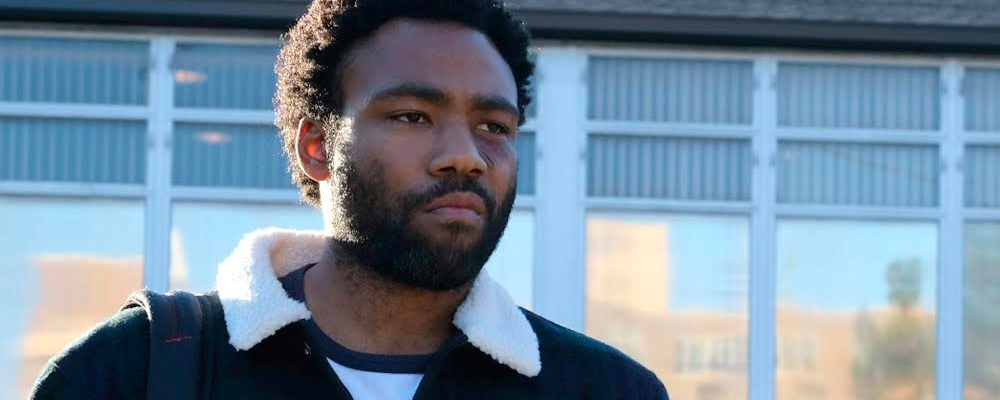‘Atlanta’ Season 2 Ends With Its Characters in Flight
Alci Rengifo
After a second season of many journeys full of personal discovery, “Atlanta” finds its main characters on a plane headed for Europe, and hopefully epic success. But life doesn’t always turn out as we planned, or hoped. More than any other show on television, “Atlanta” captures the inner-city experience within the context of trying to be an artist. As a chronicle of African American life in the 21st century it is groundbreaking in its avant-garde style. As a portrait of chasing the American dream it is vivid and stirring. The show’s key creative force, actor/producer Donald Glover and director Hiro Murai, have currently set the pop culture radar alight with their music video for the Childish Gambino song “This is America.” Charged with visceral social commentary, it is an example of music as cultural statement. But “Atlanta” is their meditative, poetic contribution as drama about the streets of America as they dream and live.
As the season finale opens, aspiring manager Earn (Glover) and Al (Brian Tyree Henry) are searching for a good entertainment lawyer. Earn would like to get a black lawyer, but Al insists they need a “high-level Jewish dude.” This is going on as Earn tries to get everything ready for a trip to Europe, where Al is slated as the opening act for a major tour. Earn is also trying to clear out the house Al has been occupying all season, which becomes a hassle when the movers procrastinate. On top of all this, Darius (Lakeith Stanfield) has forgotten to renew his passport. Earn’s personal life is also becoming complicated when he and Vanessa (Zazie Beetz) are told by their daughter Lottie’s teacher that she’s so talented, she would be better off going to a private school. But tuition is of course an issue. Indeed, everything is getting so high-pressured Earn starts to suspect Al might even be thinking of firing him. As they finally seem ready to leave for Europe, Earn suddenly realizes at the airport security check that he has Al’s gold-plated gun in his backpack.
Because “Atlanta” is designed as a chronicle of a life being lived, the second season felt like a well-conceived natural outflow from the excellent, acclaimed premiere season. It has never resorted to recycling plot lines or rehashing gimmicks, because this is the story of Earn, his struggles and Al’s developing career. Beautifully imagined with an arthouse eye, the series always feels like a slice of life. But at its core there is a fierce, social awareness that translates into intelligent, creative commentary. The season’s most famous episode was the pop culture galleria “Teddy Perkins,” in which Glover donned prosthetic whiteface to play a character obviously referencing a latter period Michael Jackson. Peppered with commentary on everything from Stevie Wonder to Nina Simone and the ongoing debate over rap and its character, and even the pressure childhood stars endure, the episode was an example of the kind of daring spirit of cultural criticism Glover excels at as a writer. Because he is socially conscious and bold, “Atlanta” touches on issues other shows shy away from, or trade over for rehashed plots involving drug deals and gangsters. Glover is interested in socio-economic conditions, but because he himself is a musician and filmmaker, he is keenly attuned to the way popular culture captures the mindsets and struggles of a society. Partnered with a director like Murai, Glover has crafted a show that proves avant-garde filmmaking has a place in urban-themed television. Notice how the penultimate episode of the season takes a pause from the narrative and goes back in time, to follow a high school-aged Earn deal with the social shame of possibly having a fake FUBU shirt.
In the season finale, personal drama mixes with more social observations which can at times become daringly funny. Earn takes Darius to get his passport issue resolved and the Jewish clerk immediately recognizes them as rappers. The clerk recommends his cousin in case they need an entertainment lawyer and Earn asks, “do you think there’s a black lawyer as good as your cousin?” The clerk simply shrugs and comments that a black lawyer just wouldn’t have his cousin’s connections, “for systemic reasons.” When Lottie’s teacher tells Earn and Vanessa their daughter should go to a private school, she bluntly tells them, “when I see a deer who can get out of the pen, I leave the gate open.”
One of the show’s most profound moments comes at the end, when Glover finds a way to ditch the gun in his backpack before boarding the plane. Al delivers an aria about how a black man has to do what he must to survive. Because the writing is subtle and the directing refined, it doesn’t come across as some sort of sermon or speech, but like an individual reflecting on the situation soberly. “Atlanta” captures how the drive to find success is not always romantic, particularly when talent emerges from specific societal conditions. Earn this season has found himself meeting with shady characters, nearly getting fired, being beaten to a pulp. Even Alfred was mugged in another episode by supposed fans when they found him alone. This show is a reminder that for every Kanye West, there are a million other stories going on of lives at the bottom of the ladder attempting to climb up.
So now Earn and Al find themselves in the air crossing the Atlantic to Europe. This show is so engrossing we don’t need cliffhangers. We want to see what happens next in the same way we wonder what turns our own lives can take tomorrow or next week. For now “Atlanta” has again left its mark as a show of sober reflection, engaging human drama, and a voice that is poetic and radical.
The “Atlanta” season two finale aired May 10 at 10 p.m. ET on FX.


